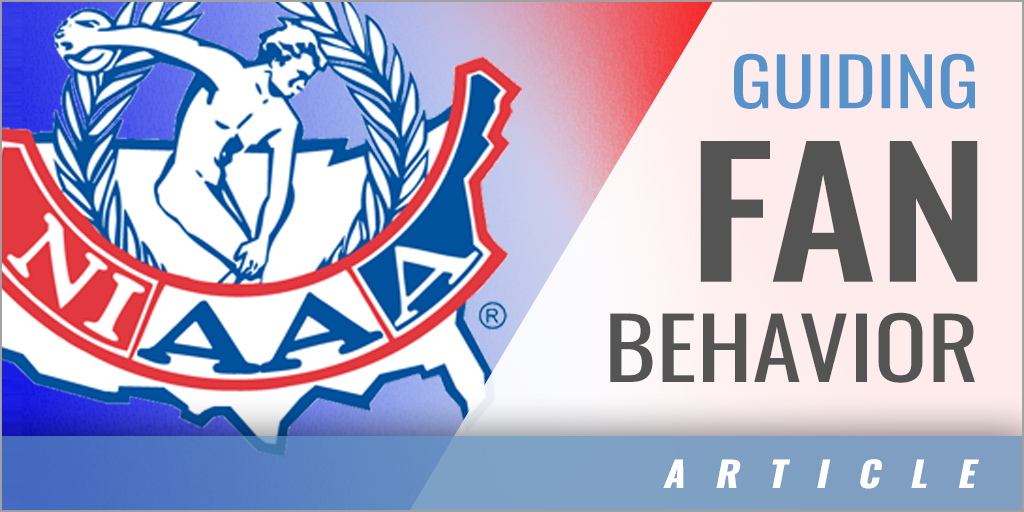|
By: Ernest Robertson Jr., CMAA – Palmer Trinity School - Miami, Florida As the pandemic has heightened tensions around school sports, this is an appropriate time to revisit strategies focused on guiding fan behavior. Controlling fan behavior at athletic contests helps provide a safe and entertaining experience for all. The four main aspects of ensuring a safe event are communication, control, visibility, and staffing. Communication is Key Strong communication with all parties will foster respect toward the time and energy that you put into your job as an athletic administrator. This includes a written emergency plan that should be accessible to all fans and spectators. A meeting of event staff and an event checklist should support your plan. By placing warning signs and sportsmanship messaging throughout your facilities, you continue to remind fans about appropriate behavior and possible dangers. Behind-the-scenes communication is equally important. Ultimately, parents will appreciate the effort you put into their child to succeed as a student-athlete at your school through answering emails or voicemails in a timely fashion, responding to issues or complaints, and of course, keeping athletes safe, both physically and mentally. As an athletic administrator, dealing with communication, however tedious, will help resolve concerns and issues in a productive way. This mutual respect will go a long way in the stands on game day. Strong communication with parents is key; seasonal parent meetings are vital for laying out your expectations. Establish a protocol for contacting you or a coach when they have a complaint, or just want to be heard, and be ready to hold up your commitment to that communication. Parents must follow these program protocols for expressing concerns or complaints. For example, they shouldn't go straight to the principal with a complaint if their kid isn't getting equal playing time. The preferred line of communication should be from the athlete to the coach first; if issues aren't resolved, a parent can then request a meeting with the coach, or AD/Administrator if the issue really escalates. Modeling Good Behavior A non-negotiable expectation of parents is that they must be good role models, always demonstrating good sportsmanship. Just as we ask this of their kids as student-athletes, parents and other fans must lead by example. Furthermore, parents must be supportive of the coach and the athletics program in general, even though they may not always agree with calls or game outcomes. Above all, parents should celebrate the effort and dedication, of not only their kid, but of game officials and coaches. This approach places importance back on the team, rather than only celebrating the personal accomplishments of individual athletes. Positive modeling allows you to demonstrate to fans that you practice your mission, values, and code of conduct. When student-athletes, coaches, officials, support staff, administration, and leadership model the behavior expected at sporting contests, fans understand the school's culture. This makes for lasting proof and practice of expectations and behavior. As an athletic administrator on game day, you should work the event, and not watch it. You must also train others, especially teachers, but also other administrators how to work your sporting events. Game day supervisors should scan their assigned area in the stands every 30 seconds. Those working the event should keep their eyes more on the stands than the playing surface. Look for suspicious behavior, and focus on behavioral activity like disgruntled facials, loud and angry fans. Identify the fan who is misbehaving with apparel and keep your eye on them. If you need to diffuse irate fan behavior, it is imperative to do it calmly and privately. You can sit near or even right next to the fan without saying a word. If it continues, however, five simple words from you to the fan could help. Those are, "How can I help you?" Just being there as a presence and asking them nicely, will go a long way. It is not advisable to yell from far away and expect this to correct their behavior at the contest. You should allow at least 24 hours before really trying to correct their behavior in a private meeting. It's important to stop their behavior at the contest, but allow at least a day or maybe the weekend to really sit down with them and another school administrator to talk about their behavior and prevent it from happening in the future. Social Media Social media is another great way to create a healthy fan experience. Social media platforms allow you to support the team, communicate with fans, announce important updates, and advertise upcoming events. Apps also allow you to reach the greatest number of fans quickly. Just as it can help promote your program, social media can also fuel fan tensions, with other fans capturing incidents and sharing them on social media. Your zero-tolerance policy for aggressive fan behavior will curb poor behavior immediately. Occasionally, well-intentioned fans get too involved, maybe not liking a call or a game result. Spread the message that criminal acts of violence will not be tolerated. Post your expectations for fan behavior around all venues where you hold contests. The savvy athletic director might use social media to survey your fan base regarding facilities, concession, public address, and the fan's overall experience. If you keep your survey short and give incentives such as discounts, prizes, or food, you can receive a fair amount of feedback in a short time. Surveys are a great way to get information about how well your plan is working and what improvements can be made, if necessary. This also increases your presence on platforms as both celebratory and administrative in nature. When developing a plan to enhance your fans' experience at athletic events, please remember that the following are critical.
Additional Resources The Safe Sport Zone (www.safesportzone.com) produces great posters that clearly state code of conduct rules, including that fans must display good sportsmanship, abide by all school rules, not harass anyone, or enter the playing surface at any time. Most importantly, their poster states that fans not following the rules will be removed. Accessible signage that you can point to, if needed, shows a fan the rules that they are breaking and can often remind folks of scholastic expectations. Should you need to remove a fan, plan to follow up with them in a meeting with another school administrator (principal or vice principal) at least 24 hours after the incident. Explain the rules to them and communicate that their behavior at the game is not tolerated. You can also suggest that they take an NFHS course on sportsmanship in order to return to another game. Addressing the issue promptly and professionally is essential to prevent further escalation or repeat behavior. Fan intervention follows a simple 3-step process…
If there is criminal activity associated with their behavior, do not hesitate to involve the police. If you don't have a school resource officer at the event and don't feel comfortable calling the police, ask an administrator to help in this regard. There is absolutely no excuse for becoming physical at a contest. It would get a student-athlete kicked out of the contest, and there's no difference in the stands. It must be an immediate exclusion from the contest. Positive Coaching Alliance Partnering with the Positive Coaching Alliance (PCA) is another great way to deal with parents and other fans in a positive way. The PCA has many resources that will help you in this endeavor. They offer workshops for parents, coaches, and even student-athletes. They also have tons of helpful free resources available at their Development Zone website (devzone.positivecoach.org). This has incredibly valuable content, especially related to this issue of fan control. They specifically suggest to…
Wrapping Up In closing, it is important to remember to communicate! You must have clear communication with your parents and set expectations of them that are repeated, often. Also do encourage positive partnerships. This goes for coaches, athletes, parents/fans, administrators, and officials. Show parents how much you care about their input and value their support of your program. And on the other hand, don't allow coaching from the stands, or even worse, sometimes from the sidelines. Do not allow comments directed at game officials. Most importantly, don't ever lose your cool. If you want to further explore the topic of fan control, check out LTC 630, a course that the NIAAA offers. It covers spectator management duties, legal obligations of athletic administrators, development of supervision plans and much more. We want to end by thanking you all for doing what you do. Being an AD is not an easy job, by any means. You are doing a great service to your students, your school, your community, and this does not go unnoticed. Athletics is a huge part of the high school experience, and the culture of the schools we all love. Your student-athletes and their parents notice all your hard work and truly appreciate all that you do for them to enjoy playing sports and that's all that really matters. |







